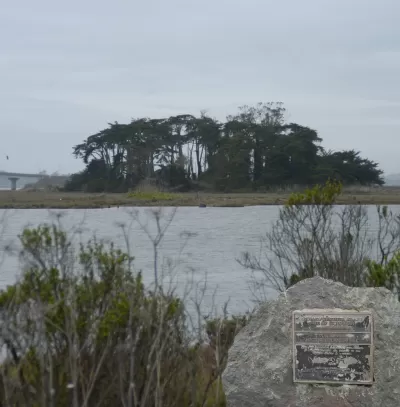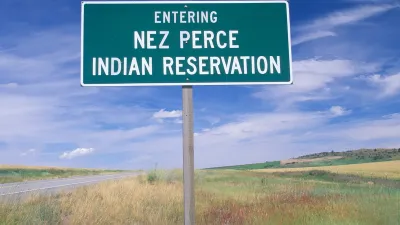The city of Eureka has returned ownership of Duluwat Island, the site of a brutal massacre in 1860 and also a deeply sacred site, to the Wiyot Tribe.

"With five words, it became official — Duluwat Island is being returned to the Wiyot people, for whom it is the physical and cultural center of the universe, a sacred piece of land with the power to bring balance to all else," reports Thadeus Greenwood.
The actions of Eureka, California in returning 200 acres of land stolen from the Wiyot Tribe are described in the article as unprecedented, culminating with the vote and the subsequent signing of a deed of trust transferring ownership to the tribe.
"The emotional ceremony saw multiple generations of local residents gathered in the Adorni Center to witness the historic vote, many wiping tears from their eyes," according to Greenwood.
According to Greenwood, the tribe first approached the city in 1970 about repatriating the island, but the process took decades to complete. "In 2000, through a series of fundraising events that ranged from Indian taco sales to art auctions, the tribe raised more than $100,000 to purchase 1.5 acres of the island from the city, a parcel that included the sacred village site of Tuluwat. Four years later, the city gave the tribe another 40 acres of the island, which for decades was commonly known locally as 'Indian Island.'"
A follow up article by Greenwood, along with Jennifer Fumiko Cahill, explores the potential for Eureka's action to provide a model for other communities looking to make similar restitutions. Yet another article by Shane Reiner-Roth provide additional details and links to national coverage of the story.
FULL STORY: Duluwat Island is Returned to the Wiyot Tribe in Historic Ceremony

Maui's Vacation Rental Debate Turns Ugly
Verbal attacks, misinformation campaigns and fistfights plague a high-stakes debate to convert thousands of vacation rentals into long-term housing.

Planetizen Federal Action Tracker
A weekly monitor of how Trump’s orders and actions are impacting planners and planning in America.

San Francisco Suspends Traffic Calming Amidst Record Deaths
Citing “a challenging fiscal landscape,” the city will cease the program on the heels of 42 traffic deaths, including 24 pedestrians.

Defunct Pittsburgh Power Plant to Become Residential Tower
A decommissioned steam heat plant will be redeveloped into almost 100 affordable housing units.

Trump Prompts Restructuring of Transportation Research Board in “Unprecedented Overreach”
The TRB has eliminated more than half of its committees including those focused on climate, equity, and cities.

Amtrak Rolls Out New Orleans to Alabama “Mardi Gras” Train
The new service will operate morning and evening departures between Mobile and New Orleans.
Urban Design for Planners 1: Software Tools
This six-course series explores essential urban design concepts using open source software and equips planners with the tools they need to participate fully in the urban design process.
Planning for Universal Design
Learn the tools for implementing Universal Design in planning regulations.
Heyer Gruel & Associates PA
JM Goldson LLC
Custer County Colorado
City of Camden Redevelopment Agency
City of Astoria
Transportation Research & Education Center (TREC) at Portland State University
Jefferson Parish Government
Camden Redevelopment Agency
City of Claremont





























